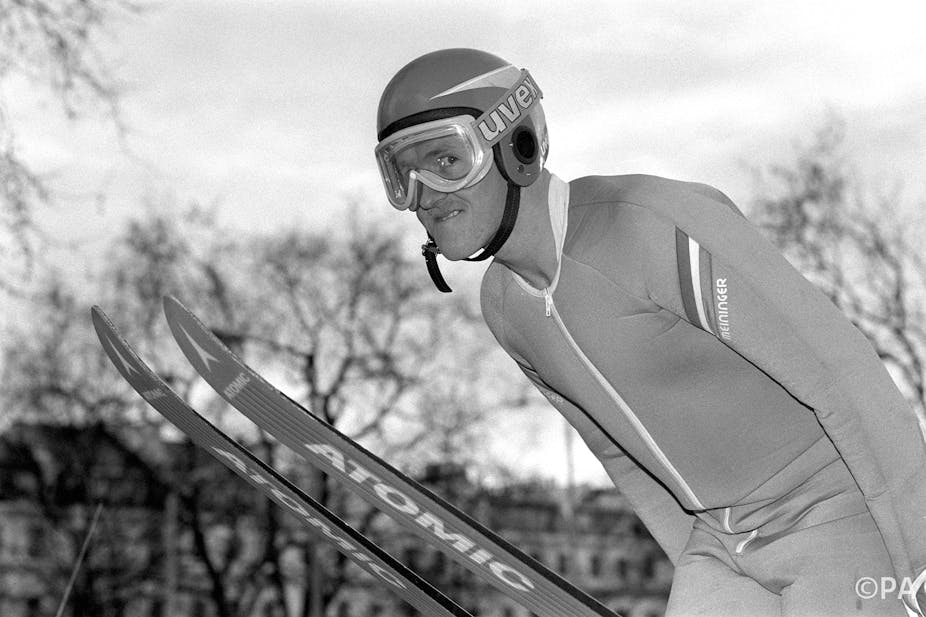When we think of heroes of the summer Olympics, we tend to remember the great achievements: those who broke records and won clutches of medals, people like Usain Bolt and Michael Phelps. But at the winter Olympics, the figures who attract the most attention and linger on in our memories are often sporting heroes of a different type.
These games bring out quirky characters who become unexpectedly popular – in the past we’ve had the famously unsuccessful British ski-jumper Eddie “the Eagle” Edwards, the Jamaican bobsleigh team that inspired the film Cool Runnings, and Stephen Bradbury, the Australian speed skater who, despite not being able to skate very fast, won an unexpected gold medal after all his opponents spectacularly piled up at the last corner.
This year’s media darling is Shiva Keshavan, the Indian luger who trains on public roads in the Himalayas, and who is competing despite not having a country to represent.
Of course the winter Olympics also showcase elite sporting talent: records are broken and triumphs achieved, just as in summer. So why do these games bring out this maverick streak in us as spectators? Perhaps it has something to do with the nature of the sports involved. Running, swimming, hurdling, jumping, and lifting weights somehow seem accessible. We can imagine being able to do these things ourselves, and our own inadequacy at them compared to Olympians makes their achievements all the more impressive.
Winter sports are much more niche – how many of us have tried our hand on a bobsleigh run? Even leaving aside the equipment and technical expertise involved, there’s an obvious geographical issue. If you’ve lived your life somewhere hundreds of miles away from snow and mountains, impressive though the sight of someone flying over a ski jump or hurtling down a luge run may be, it’s almost as fantastical as if the events involved flying jet-packs or time machines.

To some extent, then, the unlikely heroes of the winter Olympics are to do with our desire to support the underdog. It’s admirable to see someone overcoming the odds to compete, whether they’re trying to recreate a winter sport in a tropical country, struggling with a woeful lack of equipment, or simply undaunted by the tiny chances of success.
It’s easy in this context to enthuse about the Olympic spirit, and how taking part is more important than winning. But I think there’s there’s also something less cheesy and more anarchic about our relationship with these odd heroes: their existence gives us a licence to question the normal rules of success.
The ancient Greeks, the original Olympians who gave us the word “hero”, understood the need to celebrate the problematic and the unexpected as well as the fine and the noble. While nowadays we tend to use the word “hero” either in a sporting context or to describe acts of altruism, its original usage was far less unambiguously positive.
To become a hero meant something concrete in the Greek world: it normally occurred after death, and meant that you’d receive worship at the site of your tomb. Nowadays we’re familiar with the great mythological heroes like Achilles, Ajax, or Theseus, but there were hundreds if not thousands of other heroes, many of whom were real individuals who had died within living memory. And while these people were often made heroes because they’d achieved something memorable, this could involve doing something strange or outlandish just as easily as something good.

Even the most famous heroes from ancient myth are rarely good team-players who play by the rules: they’re heroes precisely because they’re unusual or troublesome characters who don’t quite fit with what’s expected of them, or who challenge social boundaries. Greek heroes tend to be individualists, people who tear up the rule book, and Greek literature tends to focus on the moments in their lives when they come into conflict with the norms.
And while ordinary people could become heroised for doing something we’d consider positive (not least, winning at the Olympic Games), there are plenty of other stories that are just plain odd. The historian Herodotus, for example, tells us of a construction worker who was heroised because he was believed to have had the loudest voice in the world.
In another even more bizarre story, we learn of a man who became a hero because after his death a swarm of bees made a nest in his skull. The underlying idea seems to have been that these were people who were somehow different from the rest and who stood out. This gave them a power that was believed to abide after their death.
So when you see media attention directed to an eccentric athlete at Sochi, remember that idolising the improbable has just as good a pedigree as praising the greatest of talents. Legends about difficult or surprising heroes offered the ancients a safe space to reflect upon the rules that govern conventional behaviour and how much they matter.
We often complain about the machine that the modern Olympic movement has become with its massive expenditure, extravagant displays, and commercial sponsorship. In this context, it’s liberating to celebrate something that’s not sanitised and perfect, and these strange heroes offer us a way to poke fun, a way to humanise everything that’s pompous or self-important about the modern Olympic movement.

